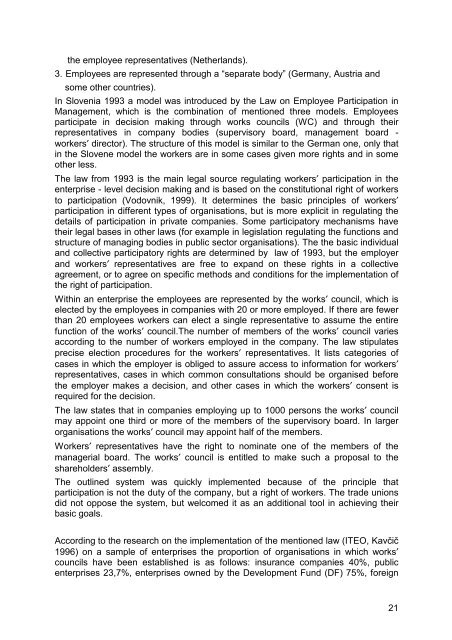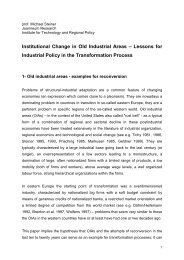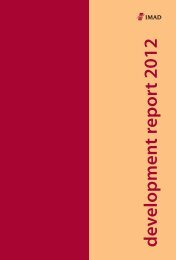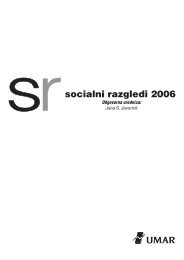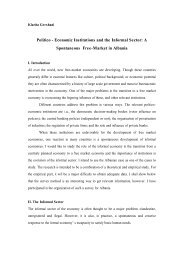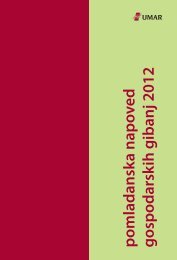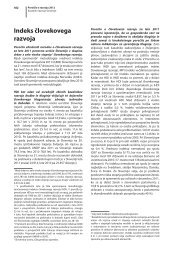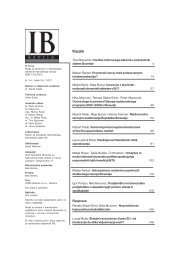The Development of New Industrial Relations in Slovenia - UMAR
The Development of New Industrial Relations in Slovenia - UMAR
The Development of New Industrial Relations in Slovenia - UMAR
You also want an ePaper? Increase the reach of your titles
YUMPU automatically turns print PDFs into web optimized ePapers that Google loves.
the employee representatives (Netherlands).<br />
3. Employees are represented through a “separate body” (Germany, Austria and<br />
some other countries).<br />
In <strong>Slovenia</strong> 1993 a model was <strong>in</strong>troduced by the Law on Employee Participation <strong>in</strong><br />
Management, which is the comb<strong>in</strong>ation <strong>of</strong> mentioned three models. Employees<br />
participate <strong>in</strong> decision mak<strong>in</strong>g through works councils (WC) and through their<br />
representatives <strong>in</strong> company bodies (supervisory board, management board -<br />
workers′ director). <strong>The</strong> structure <strong>of</strong> this model is similar to the German one, only that<br />
<strong>in</strong> the Slovene model the workers are <strong>in</strong> some cases given more rights and <strong>in</strong> some<br />
other less.<br />
<strong>The</strong> law from 1993 is the ma<strong>in</strong> legal source regulat<strong>in</strong>g workers′ participation <strong>in</strong> the<br />
enterprise - level decision mak<strong>in</strong>g and is based on the constitutional right <strong>of</strong> workers<br />
to participation (Vodovnik, 1999). It determ<strong>in</strong>es the basic pr<strong>in</strong>ciples <strong>of</strong> workers′<br />
participation <strong>in</strong> different types <strong>of</strong> organisations, but is more explicit <strong>in</strong> regulat<strong>in</strong>g the<br />
details <strong>of</strong> participation <strong>in</strong> private companies. Some participatory mechanisms have<br />
their legal bases <strong>in</strong> other laws (for example <strong>in</strong> legislation regulat<strong>in</strong>g the functions and<br />
structure <strong>of</strong> manag<strong>in</strong>g bodies <strong>in</strong> public sector organisations). <strong>The</strong> the basic <strong>in</strong>dividual<br />
and collective participatory rights are determ<strong>in</strong>ed by law <strong>of</strong> 1993, but the employer<br />
and workers′ representatives are free to expand on these rights <strong>in</strong> a collective<br />
agreement, or to agree on specific methods and conditions for the implementation <strong>of</strong><br />
the right <strong>of</strong> participation.<br />
With<strong>in</strong> an enterprise the employees are represented by the works′ council, which is<br />
elected by the employees <strong>in</strong> companies with 20 or more employed. If there are fewer<br />
than 20 employees workers can elect a s<strong>in</strong>gle representative to assume the entire<br />
function <strong>of</strong> the works′ council.<strong>The</strong> number <strong>of</strong> members <strong>of</strong> the works′ council varies<br />
accord<strong>in</strong>g to the number <strong>of</strong> workers employed <strong>in</strong> the company. <strong>The</strong> law stipulates<br />
precise election procedures for the workers′ representatives. It lists categories <strong>of</strong><br />
cases <strong>in</strong> which the employer is obliged to assure access to <strong>in</strong>formation for workers′<br />
representatives, cases <strong>in</strong> which common consultations should be organised before<br />
the employer makes a decision, and other cases <strong>in</strong> which the workers′ consent is<br />
required for the decision.<br />
<strong>The</strong> law states that <strong>in</strong> companies employ<strong>in</strong>g up to 1000 persons the works′ council<br />
may appo<strong>in</strong>t one third or more <strong>of</strong> the members <strong>of</strong> the supervisory board. In larger<br />
organisations the works′ council may appo<strong>in</strong>t half <strong>of</strong> the members.<br />
Workers′ representatives have the right to nom<strong>in</strong>ate one <strong>of</strong> the members <strong>of</strong> the<br />
managerial board. <strong>The</strong> works′ council is entitled to make such a proposal to the<br />
shareholders′ assembly.<br />
<strong>The</strong> outl<strong>in</strong>ed system was quickly implemented because <strong>of</strong> the pr<strong>in</strong>ciple that<br />
participation is not the duty <strong>of</strong> the company, but a right <strong>of</strong> workers. <strong>The</strong> trade unions<br />
did not oppose the system, but welcomed it as an additional tool <strong>in</strong> achiev<strong>in</strong>g their<br />
basic goals.<br />
Accord<strong>in</strong>g to the research on the implementation <strong>of</strong> the mentioned law (ITEO, Kavčič<br />
1996) on a sample <strong>of</strong> enterprises the proportion <strong>of</strong> organisations <strong>in</strong> which works′<br />
councils have been established is as follows: <strong>in</strong>surance companies 40%, public<br />
enterprises 23,7%, enterprises owned by the <strong>Development</strong> Fund (DF) 75%, foreign<br />
21


